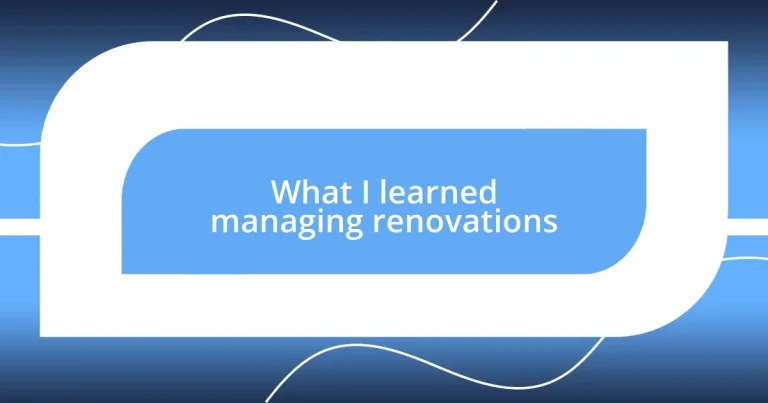Key takeaways:
- Unexpected challenges, like hidden leaks and contractor delays, teach resilience and flexibility in managing renovation projects.
- Effective planning, including realistic timelines, detailed budgets, and seeking professional advice, is crucial for successful renovations.
- Clear communication with contractors and regular check-ins ensure alignment on project goals and enhance collaboration for better outcomes.

My renovation management experience
Managing renovations has been one of the most enlightening experiences of my life. I remember standing in my living room with the walls stripped bare, feeling a mix of excitement and trepidation. Have you ever felt that gut-wrenching fear as you contemplate if this vision will ever come to life? That was me, grappling with the enormity of decision-making as I chose colors, materials, and layouts that would shape my home for years to come.
One unforgettable moment was the day I discovered a hidden leak behind the wall. I was frustrated, to say the least. Who knew that a simple renovation could lead to such surprises? In hindsight, those setbacks taught me resilience. Each challenge became a lesson, and every mistake turned into a stepping stone for my growth as a manager of my own renovation project.
As I navigated through the chaos, I found that patience truly is a virtue. I learned to celebrate the small victories, like when the drywall went up or the new flooring was finally laid. Those moments filled me with a profound sense of accomplishment. Have you ever felt that rush when a project finally comes together? It’s incredibly rewarding, and those feelings kept me motivated through the long, sometimes overwhelming, journey of managing my renovations.
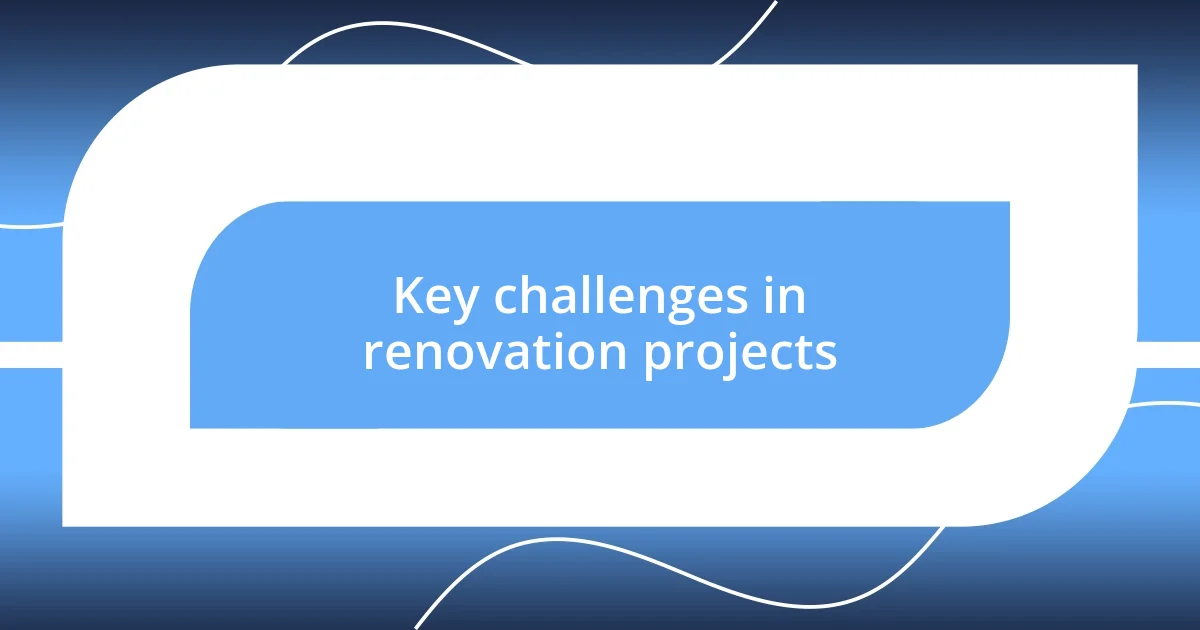
Key challenges in renovation projects
When diving into a renovation project, unexpected hurdles often pop up like weeds in a garden. One challenge I faced was coordinating schedules between various contractors. I still remember feeling the frustration bubble up when a plumber didn’t show on the day he was supposed to, leaving me with a half-finished bathroom. These delays can lead to a domino effect, pushing back timelines and inflating budgets, which can be disheartening.
Here are some key challenges to watch for:
- Budget Overruns: It’s easy to underestimate costs, especially when surprises like damaged wiring or plumbing issues arise.
- Timeline Delays: Schedules can easily slip due to contractor availability or unexpected repairs.
- Decision Fatigue: The sheer number of choices can be overwhelming, from fixtures to finishes, leading to second-guessing.
- Communication Breakdowns: Misunderstandings with contractors can lead to mistakes, making clarity essential.
- Permit Problems: Navigating the red tape around permits can turn into a time-consuming headache.
I also recall how challenging it was to manage my expectations. Sometimes, what I’d envisioned in my mind didn’t translate perfectly into reality. The first time I saw a wall color that I thought would be calming turn out to be utterly bold, my heart sank a bit. That was a defining moment. I realized flexibility was key; sometimes, you just have to roll with the punches and adapt your plans to create a final result that feels right — even if it wasn’t the exact picture I had in my head.

Effective planning for renovations
When I think about effective planning for renovations, I can’t help but emphasize the importance of a well-structured timeline. The project I managed took a lot longer than expected because I hadn’t anticipated how long certain tasks would take. I vividly remember thinking, “How hard can it be to install a new sink?” Yet, I learned the hard way that proper plumbing is an art! Setting realistic deadlines and building in buffer time for each project phase is crucial.
Financial planning also plays a significant role in successful renovations. During my project, I remember the moment I realized that my initial budget had a few gaps. A quick trip to the hardware store for “just a few extras” turned into a hefty bill. To avoid this pitfall, I learned to account for about 15% more than my estimate for unexpected expenses. This little tip saved me from sleepless nights worrying over a broken budget.
Lastly, one of the most valuable lessons I learned was to enlist trusted professional advice during the planning stage. I made the mistake of thinking I could tackle everything solo early on. It wasn’t until my vision became muddled that I reached out to a friend with renovation experience. Their input helped clarify my direction and reignited my excitement for the project. Seeking expert advice can seem daunting, but sometimes it’s the best way to ensure your renovation plan is solid.
| Planning Aspect | Key Insights |
|---|---|
| Timeline | Set realistic deadlines and include buffer time to account for delays. |
| Budget | Estimate an extra 15% for unexpected costs to avoid financial stress. |
| Expert Advice | Consult experienced friends or professionals to clarify your vision and avoid confusion. |
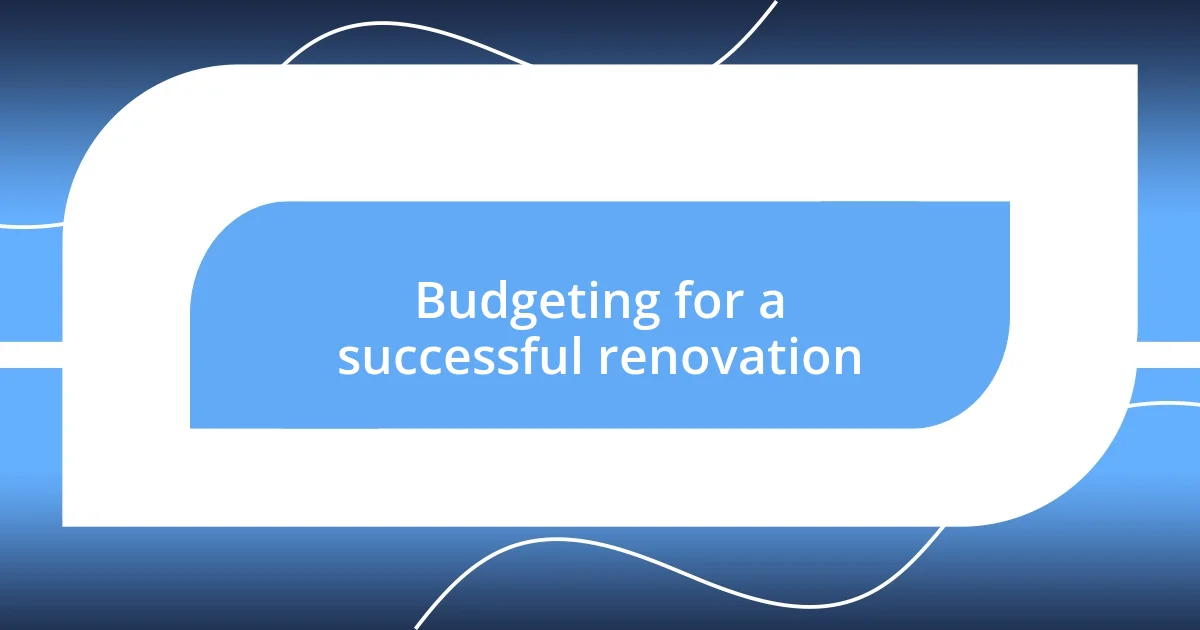
Budgeting for a successful renovation
Thinking about budgeting for a renovation, I often reflect on how vital it is to set a well-defined budget from the very beginning. During my own renovation, I sketched out what I thought were all the necessary expenses, but to my surprise, the costs started piling up faster than I could keep track. Have you ever found yourself in a similar situation, thinking you had it all figured out, only to be blindsided by additional expenses?
One moment that still lingers with me was when I decided to splurge on high-end materials. I vividly remember staring at my beautiful new tiles, only to feel a pang of regret as I watched my budget dwindle. I realized then that there’s a fine balance between investing in quality and staying within financial limits. It taught me that prioritizing what truly matters to you—like kitchen finishes or flooring—can help you allocate funds more effectively and avoid unnecessary compromises.
A budgeting strategy that worked wonders for me was creating a detailed line-item budget. I broke down costs into categories, like labor, materials, and incidentals. This method allowed me to visually track my spending and identify areas where I could cut back without sacrificing quality. Did it take some extra time and effort? Absolutely. But the peace of mind it brought during the renovation process was well worth it. I learned that a clear financial roadmap not only helps keep the project on track but also mitigates stress, allowing you to focus more on the exciting aspects of transforming your space.
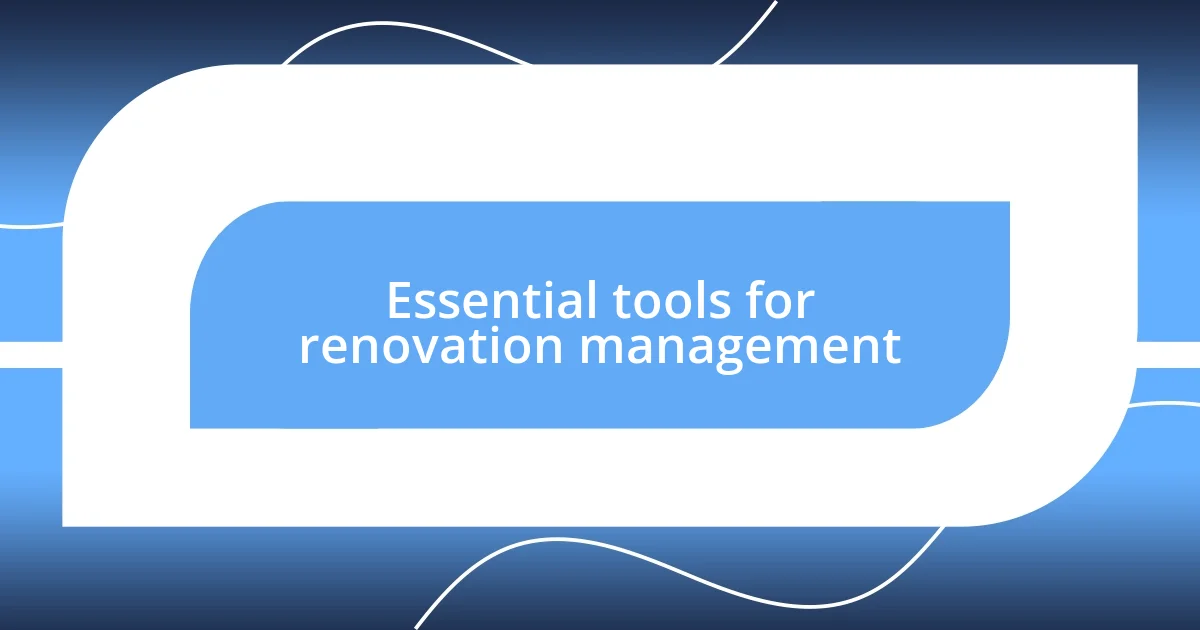
Essential tools for renovation management
For effective renovation management, having the right tools at your disposal is absolutely essential. I learned firsthand that a reliable project management software can make a world of difference. Tracking progress, assigning tasks, and communicating with contractors all in one place simplified my chaotic to-do list, transforming it into a manageable workflow. It felt like I finally had my arms wrapped around the entire project, instead of watching it spin out of control.
Another indispensable tool is a detailed checklist. I remember sitting down to create one and thinking it would be tedious. Yet, once I started, I was amazed at how much clarity it provided. Each time I checked an item off, I felt a sense of accomplishment. It kept me grounded and ensured that no small details slipped through the cracks—how many of us have forgotten the little things that can spiral into big headaches?
Lastly, maintaining a communication log was a game changer for me. During my renovations, misunderstandings with contractors can lead to costly errors. By jotting down key conversations and decisions, I was able to refer back to what had been agreed upon. This practice not only fostered transparency but also built trust with my team. Have you ever had a project go awry because of miscommunication? Keeping records saved me from unnecessary stress and kept everyone on the same page.
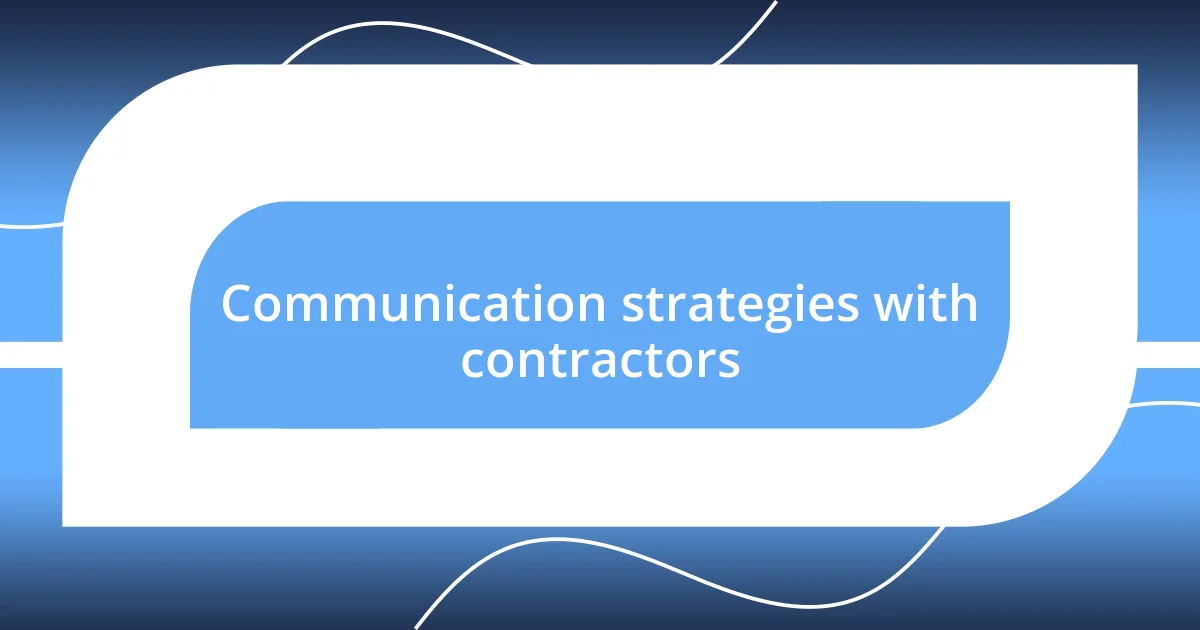
Communication strategies with contractors
Effective communication with contractors is crucial, and I’ve found that setting clear expectations from the start can save so much heartache down the line. During my renovation, I remember feeling frustrated when the contractor didn’t grasp my vision for the space. To remedy this, I created a simple yet detailed document outlining all my needs and preferences. Have you ever wished you could just put your thoughts on paper and have everything magically come to life? That’s exactly how I felt, and it worked wonders in ensuring we were on the same page.
Regular check-ins became a lifeline for me throughout the process. I scheduled quick weekly meetings where we’d discuss progress, address concerns, and make adjustments if necessary. These touchpoints were invaluable—there’s nothing worse than finding out something’s amiss only at the final reveal. Reflecting on those moments, it felt reassuring to know I could voice my thoughts, and it empowered my contractors to share their insights too. How often do we underestimate the power of a simple conversation?
I also learned the importance of being open to feedback. At one point, my contractor suggested a modification to my original plan that made a significant impact on the overall flow of the space. Initially, I was hesitant; it wasn’t part of my vision. But taking a step back and considering his expertise helped me understand that this was a collaboration. Isn’t that what a renovation should ultimately feel like? Embracing that collaborative spirit nourished our working relationship and ultimately led to a result I was even prouder of.

Evaluating the success of renovations
Evaluating the success of renovations is often more nuanced than it initially appears. For me, it meant going beyond just admiring the new paint or flooring; it was about assessing whether the goals I had set at the start were achieved. I vividly recall standing in my newly renovated kitchen and feeling an unexpected wave of disappointment. It looked beautiful, yet it didn’t quite function the way I had envisioned. Have you ever been in a space that felt more like a missed opportunity than a triumph?
I learned that tracking key performance indicators—like budget adherence and timeline management—was essential to gauge true success. After wrapping up my project, I took a real hard look at my finances and whether I came in under budget. Surprisingly, I discovered that while I had spent less than anticipated, I also compromised on some elements that mattered most to me. This reflection pushed me to define what “success” really meant for my next renovation. When you think about your home projects, have you ever stopped to ask yourself if you’ve identified the right metrics to measure success?
Lastly, soliciting feedback from friends and family added another layer of insight into my evaluation process. I remember hosting a small gathering shortly after the renovations wrapped up. Listening to their remarks really helped me see the project from different perspectives. It wasn’t just about their admiration but also the honest critiques that opened my eyes to areas needing improvement. How often do we seek out feedback but only look for validation? I realized that embracing constructive criticism could make all the difference in my future renovations.












